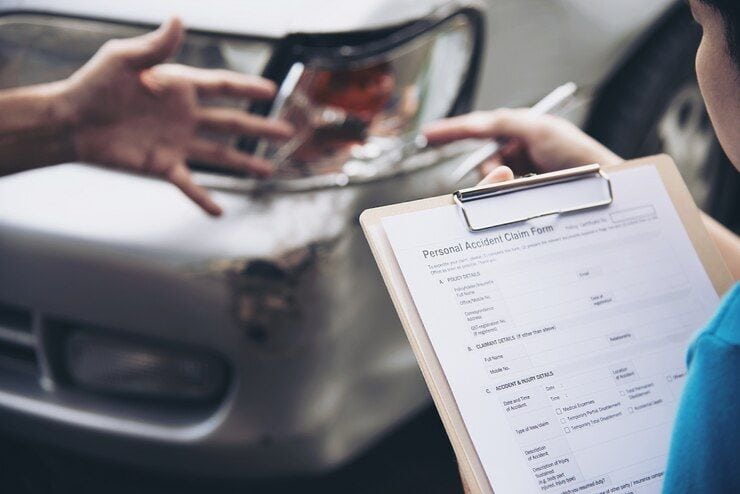
Car accidents can be traumatic experiences, leaving individuals shaken and unsure of the next steps to take. One crucial aspect of the post-accident protocol is the exchange of information between the parties involved. But what if this doesn’t happen? What are the legal consequences, and how can an experienced personal injury lawyer assist you in navigating this complex situation?
In this article, we’ll delve into the repercussions of not exchanging information after a car accident in Nevada, exploring the legal intricacies and the vital role an attorney can play.
The Importance of Exchanging Information:
After a car accident occurs, emotions run high, and it’s not uncommon for individuals to feel overwhelmed. However, exchanging information with the other party involved is a critical step. This includes details such as names, addresses, phone numbers, license numbers, and other driver’s insurance information. Failure to do so can lead to a myriad of complications.
Legal Consequences of Not Exchanging Information:
Failure to File a Police Report:
In Nevada, it’s essential to report an accident to the police if there are injuries, deaths, or property damage exceeding $750. If you neglect to exchange information, you might not have the necessary details to provide to law enforcement, potentially leading to legal consequences for failing to report the incident promptly.
Complications with Insurance Claims:
Without the other driver’s insurance company information, you may face challenges when filing a claim with your car insurance company. Insurance providers typically require details about the other party involved to process a claim efficiently. Failure to provide this information might result in delays or denials of your claim.
Hit and Run Impact:
If the other driver leaves the scene without exchanging information, it’s considered a hit-and-run. This is a serious offense under Nevada law and can result in criminal charges for the fleeing driver. However, it also leaves you grappling with the aftermath, including potential out-of-pocket expenses for car repairs and medical bills.
Difficulty Establishing Fault:
Exchanging information is crucial for determining fault in an accident. Without the necessary details, establishing who was at fault becomes a challenging task. This can have implications for your insurance rate, compensation for damages, and legal options moving forward.
What Should You Do if the Other Driver Does Not Exchange Information?
Experiencing a car accident is undoubtedly a stressful event, and it becomes even more challenging when the other driver refuses to exchange insurance information. In such a situation, it’s crucial to stay calm and take specific steps to protect your rights and ensure a smoother resolution. Here’s a guide on what to do if the other driver does not exchange information after an accident:
Document the Scene: Take pictures of the accident scene, including the vehicles involved, the surrounding area, and any visible damages. Note the vehicle’s license plate number, make and model, and the conditions at the time of the accident.
Check for Witnesses: If there are witnesses to the accident, ask for their contact information. Their statements may prove valuable in supporting your version of events.
Call the Police: If the other driver refuses to exchange information, immediately call the police. In many jurisdictions, it’s a legal requirement to report accidents resulting in injury, death, or significant property damage.
Seek Medical Attention: Regardless of whether you have all the necessary information or not, prioritize seeking medical attention for any injuries sustained during the accident. Prompt medical care is crucial for your well-being and establishes a record of injuries linked to the accident.
Notify Your Insurance Company: Contact your own insurance company as soon as possible. Provide them with all the information you have, including the police report and any documentation collected at the scene.
Use Your Insurance Coverage: If you have uninsured motorist (UM) coverage, it can help cover your damages in situations where the at-fault driver is either unidentified or uninsured.
File a Lawsuit if Necessary: If all else fails, and you are unable to obtain compensation through negotiations or insurance claims, consider filing a lawsuit against the at-fault driver. A lawsuit may compel the other driver to provide the necessary information and seek compensation for your damages.
Consider Small Claims Court: For cases involving smaller amounts, explore the option of filing a claim in small claims court. Small claims court is designed to handle disputes efficiently, and individuals can represent themselves, reducing the need for extensive legal proceedings.
How an Legal Attorney Can Help:
In such situations, seeking the assistance of an experienced personal injury lawyer becomes crucial. Let’s explore how an attorney can help navigate the complexities and ensure you receive the compensation you deserve.
Navigating Insurance Claims: Your attorney can liaise with insurance companies on your behalf. They understand the intricacies of dealing with insurance providers and can ensure that your claim is appropriately processed, even in the absence of the other driver’s information.
Legal Options and Lawsuits: If negotiations with the insurance company prove unfruitful, your attorney can explore legal options. This may involve filing a lawsuit to seek the compensation you deserve. An experienced lawyer can guide you through the legal process, advocating for your rights and interests.
Understanding Nevada Law: Nevada has specific laws governing car accidents, and an attorney well-versed in these regulations can be invaluable. From the requirements for reporting accidents to the implications of hit and runs, having legal expertise ensures that you are on solid ground when pursuing your case.

Get Help from a Skilled Car Accident Attorney at BLG
Experiencing a car accident is stressful, and the aftermath can be even more so if information isn’t exchanged. Understanding the legal consequences of this oversight is crucial for protecting your rights and seeking the compensation you deserve.
An experienced personal injury lawyer can be your ally in navigating the complexities of insurance claims and legal proceedings, ensuring that you are not left shouldering the financial burden alone. Remember, when in doubt, seek legal counsel to secure the best possible outcome in the aftermath of a car accident in Nevada.
If you find yourself entangled in the aftermath of a car accident, don’t navigate the complexities alone. At BLG, our skilled car accident attorneys are here to guide you through the legal intricacies, ensuring your rights are protected. Whether you’re facing insurance challenges or dealing with the aftermath of a hit and run, our team is ready to advocate for you.
Contact BLG today for a free consultation.
FAQs
What do exchanges mean when you get into an accident?
Exchanges refer to the sharing of information between drivers involved in an accident, including names, contact details, insurance information, and vehicle registration. This exchange is crucial for insurance claims and legal proceedings.
What does accident exchange do?
Accident exchange involves sharing necessary information with the other party involved in the accident. This typically includes details like names, phone numbers, insurance information, and sometimes photos of the accident scene.
Why should you always collect the other driver’s information in a fender bender?
Collecting the other driver’s information in a fender bender is crucial for insurance purposes. It helps ensure a smooth claims process and facilitates communication between the parties involved and their respective insurance companies.





